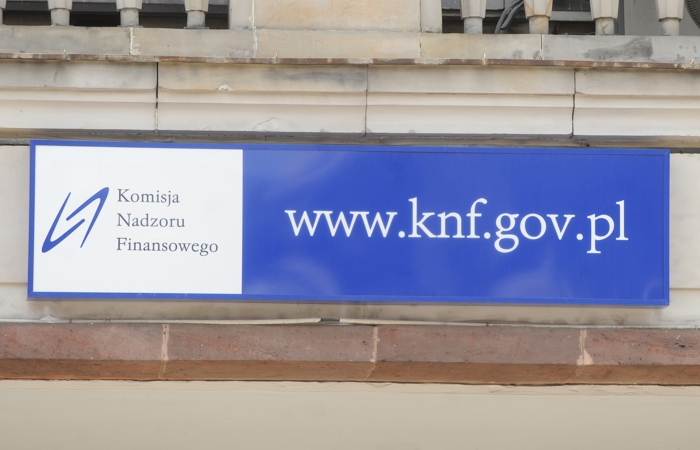The deadline for implementing the KNF guidelines has passed. What will change?
The fact that investments in the Forex market belong to the most risky ones can be heard widely, and that in order to invest in leveraged derivative instruments, adequate knowledge and experience should be available beforehand. On the other hand, investment companies should do everything to ensure that their brokerage services are as transparent as possible for retail clients.
Meanwhile, the increasing number of complaints that have been submitted to the Polish Financial Supervision Authority in recent years indicates that this was not always the case. Due to the large scale of improper practices, a large percentage of clients who recorded losses on the Forex market and cases of withdrawal of permits, inclusion on the list of warnings, the PFSA decided to define guidelines for the provision of brokerage services on the OTC derivatives market. 30 September 2016 was the deadline for their implementation for all market participants.
How did the market react to these changes and what does it mean in practice for people investing in the Forex market?
Guidelines. What do they contain and for what purpose have they been introduced?
In line with the KNF assurance, the basic goal of introducing guidelines regarding the Forex market is the need to strengthen the protection of individual investors who, in the hope of profits, often risk very large sums. For this reason, it is particularly important to provide them with transparent and fair investment rules. First of all, a person who decides to invest in the Forex market should be previously aware of the real risk involved. This makes honest advertising and promotion of brokerage services particularly important. In addition, the KNF guidelines aim to eliminate imbalances that arise in the rights and obligations of both parties. The guidelines also have the task of regulating situations in which a possible conflict of interests could arise and draw attention to the selection and training of personnel and legal relations with third parties.
The KNF guidelines were formulated in sixteen points:
The role of the investment firm's authorities in the organization of brokerage services on the OTC derivatives market.
- Powers of the supervisory board (supervision of brokerage activities) in the field of the OTC derivatives market, management board - implementation of these areas in a manner that is lawful and does not jeopardize the client's interests.
Acquisition of clients and conclusion of contracts for the provision of brokerage services on the OTC derivatives market with clients
- Regulations regarding promotional and marketing activities. They should be conducted in accordance with the client's interest, so as not to mislead him, knowingly exposing him to the loss of money invested. The client should be aware of the actual risk associated with investing in OTC derivatives.
- The role of supervision over third parties that can mediate in acquiring clients for an investment company. Also, they should be guided in this respect by the interest of the potential client and only provide him with real information, indicating that investing in the Forex market always involves the risk of losing the invested funds.
- The obligation to exercise due diligence in informing the client about the rules of investing in the Forex market, the information provided should be reliable, complete and not misleading.
- The need to regularly train employees of investment companies and employees in third parties (see section 3.), Which mediate in transactions, so that they can provide clients with current and complete knowledge of the Forex market.
- The commitment of investment companies to survey the opinions of their clients about the provision of brokerage services, sharing the obtained results with clients.
Selected issues in the scope of contracts for the provision of brokerage services on the OTC derivatives market
- The obligation to formulate the offer in such a way that, in the interests of retail clients, it has the greatest possible relation to real market conditions. It is recommended to determine the appropriate amount of the security deposit, recommending holding a surplus over this security.
- The need to provide the customer with information on the time when the order to purchase or sell an instrument is executed from the moment of registration in the IT system.
- The need to regularly publish information on the results obtained on the company's investment firm's website.
- The requirement to use commonly valid terminology in contracts that comply with the law.
- The requirement to use reliable information on fees and commissions and all kinds of other fees that clients must incur, in particular, it is important to disclose what are the charges payable to the client for the investment firm.
- Clearly defined rights and obligations of both parties as well as the mode and terms of their provision.
Provision of brokerage services for portfolio management, which includes one or more financial instruments from the OTC derivatives market.
- The obligation to provide the customer with reliable and complete information on the composition of the portfolio, investment limits, objective financial ratios and the rules of engaging customer funds.
- The obligation to counteract conflicts of interest and equal treatment of clients.
- The obligation to ensure the active participation of investment advisors in the decision making process by the retail client.
- Systematic and effective supervision over the investment portfolio.
The pressure to disclose sources of income for brokers?
Although the Polish Financial Supervision Authority clearly declares that the purpose of the guidelines is to increase the protection of the interests of individual investors, the first thing that stands out is the high pressure to disclose the sources of brokers' income. Until now, they only had to provide information on swap points and the basis for calculating them. Now the information for the investor is to be much wider. Supervision will not only require the disclosure of very detailed information on the amount by which each open position is adjusted once a day, but brokerage houses will have to provide information on their margin that is used in their calculation. A client of a brokerage house should be aware of the actual cost that it incurs for the investment firm. This in turn leads to the need to disclose the actual sources of income of the brokers. The Polish Financial Supervision Authority emphasizes that it will fight such situations where investment firms illegally levy "tax" from holders of long positions, to which they do not have the right, and which was a common practice so far.
The mechanism of exchange rate developments
Until now, people investing in the Forex market were not aware of their actual fees to the brokerage house. These sums were hidden in the difference in rates at which positions were opened and closed. From now on, the client should specify the market spread and the additional margin charged by the investment firm.
The exchange rate mechanism itself has also been taken under the microscope. In many situations, when the exchange rate changed very quickly and dynamically, there were conflicts between brokerage houses and their clients. From now on individual clients are to have the right to information, which the institution provides quotes, which are the basis for calculating the exchange rate. According to the guidelines, one of the methods of compulsory closing of the position (stop-out) was also questioned in the situation when the demand for supplementing the security deposit is called.
Will the introduction of KNF guidelines allow me to learn about the real risk associated with investing in the Forex market?
Disclosure of occasional information about investment companies operating in the Forex market was not optimistic. Not only were they often associated with aggressive forms of marketing and companies often registered in Cyprus, in 2013 the Polish Financial Supervision Authority revealed information that only 19% of all customers earned this way. This sparked a wave of criticism. It was not fully justified due to the fact that this information was misinterpreted as: "81% of individual clients lost in the Forex market". Meanwhile, 81% are people who either lost or their ownership status remained unchanged, for example because many of these accounts remained inactive. If the PFSA actually manages to enforce full transparency of transactions on the Forex market, it may mean getting to know the real level of risk associated with investing in leveraged derivatives.
Surprising first data.
You can make money on the Forex market! The first data disclosed shows a picture of investing in the Forex market - much less pessimistic than expected. The information from the three largest brokerage houses in Poland, ie X-Trade Brokers, TMS Brokers and DM BOŚ, shows that the market earns many more clients than the old fragmentary information disclosed by the Polish Financial Supervision Authority indicated. Last year, 38% of clients of these brokerage houses made profits from index-based instruments, 44% from derivatives based on commodities, stocks and currencies, and “as much as” 55% from predicting the level of interest rates.
It is not yet known how to interpret these data and which results in a large discrepancy with the data previously reported by the KNF. Theoretically, it is possible to hypothesize that during the time that has elapsed since the data was published by KNF, clients have learned to avoid basic mistakes;). Such results may, however, also be caused by other factors: for example, the fact that in the current period the situation on world markets is quite calm.
A less optimistic scenario is that other brokerage houses that have not yet published information have achieved far worse results than the three main players.
Is it really like this? This will happen soon, when we look deeper into the structure of companies, to know who really and under what conditions provides these services for us.






















![Forex Club – Tax 9 – Settle tax on a foreign broker [Download the Application] Forex Club - Tax 9](https://forexclub.pl/wp-content/uploads/2024/02/Forex-Club-Podatek-9-184x120.jpg?v=1709046278)
![Trading View platform – solutions tailored to the needs of traders [Review] trading view review](https://forexclub.pl/wp-content/uploads/2024/03/trading-view-recenzja-184x120.jpg?v=1709558918)
![How to connect your FP Markets account to the Trading View platform [Guide] fp markets trading view](https://forexclub.pl/wp-content/uploads/2024/02/fp-markets-trading-view-184x120.jpg?v=1708677291)
![How to invest in ChatGPT and AI? Stocks and ETFs [Guide] how to invest in chatgpt and artificial intelligence](https://forexclub.pl/wp-content/uploads/2023/02/jak-inwestowac-w-chatgpt-i-sztuczna-inteligencje-184x120.jpg?v=1676364263)



![Izabela Górecka – “Success on the market depends not only on knowledge, but also on emotional stability” [Interview] Izabela Górecka - interview](https://forexclub.pl/wp-content/uploads/2024/04/Izabela-Gorecka-wywiad-184x120.jpg?v=1713870578)
![WeWork – the anatomy of the collapse of a company valued at $47 billion [WeWork, part II] wework bankruptcy story](https://forexclub.pl/wp-content/uploads/2024/04/wework-bankructwo-historia-184x120.jpg?v=1711729561)
![Adam Neumann – the man who screwed up Softbank [WeWork, part AND] adam neumann wework](https://forexclub.pl/wp-content/uploads/2024/04/adam-neumann-wework-184x120.jpg?v=1711728724)





![The most common mistakes of a beginner trader - Mr Yogi [VIDEO] Scalping - The most common mistakes of a beginner trader - VIDEO](https://forexclub.pl/wp-content/uploads/2024/03/Scalping-Najczestsze-bledy-poczatkujacego-tradera-VIDEO-184x120.jpg?v=1711601376)
![Learning patience: No position is also a position - Mr Yogi [VIDEO] Scalping - Learning patience - No position is also a position - VIDEO](https://forexclub.pl/wp-content/uploads/2024/03/Scalping-Nauka-cierpliwosci-Brak-pozycji-to-tez-pozycja-VIDEO-184x120.jpg?v=1710999249)
![When to exit a position and how to minimize losses - Mr Yogi [VIDEO] Scalping - When to exit a position and how to minimize losses - VIDEO](https://forexclub.pl/wp-content/uploads/2024/03/Scalping-Kiedy-wyjsc-z-pozycji-i-jak-minimalizowac-straty-VIDEO-184x120.jpg?v=1710336731)





![Learning patience: No position is also a position - Mr Yogi [VIDEO] Scalping - Learning patience - No position is also a position - VIDEO](https://forexclub.pl/wp-content/uploads/2024/03/Scalping-Nauka-cierpliwosci-Brak-pozycji-to-tez-pozycja-VIDEO-300x200.jpg?v=1710999249)












